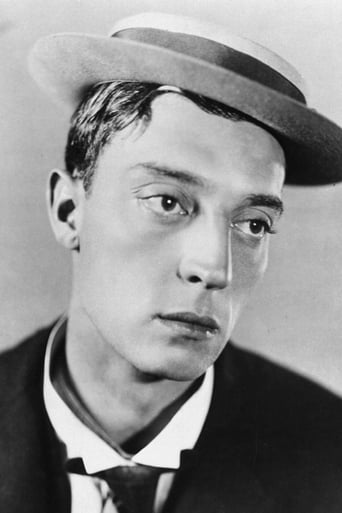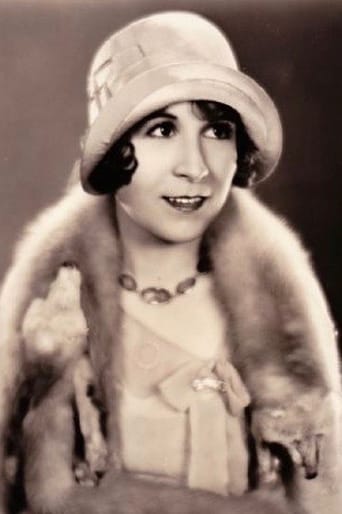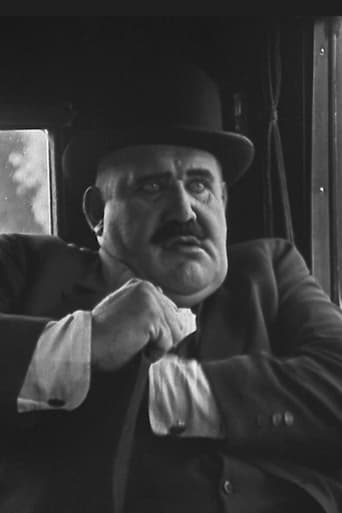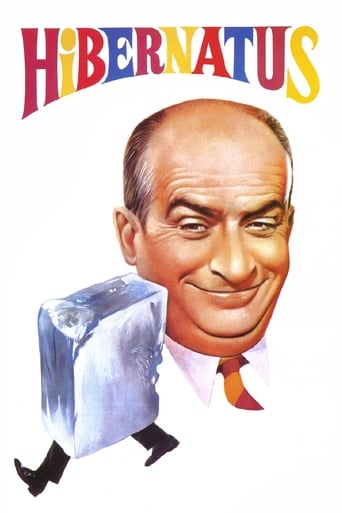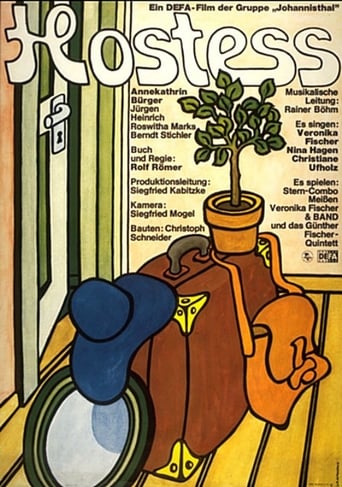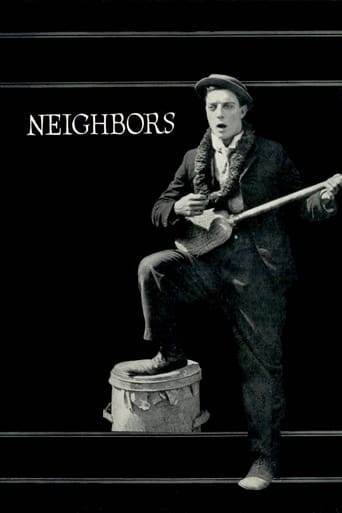
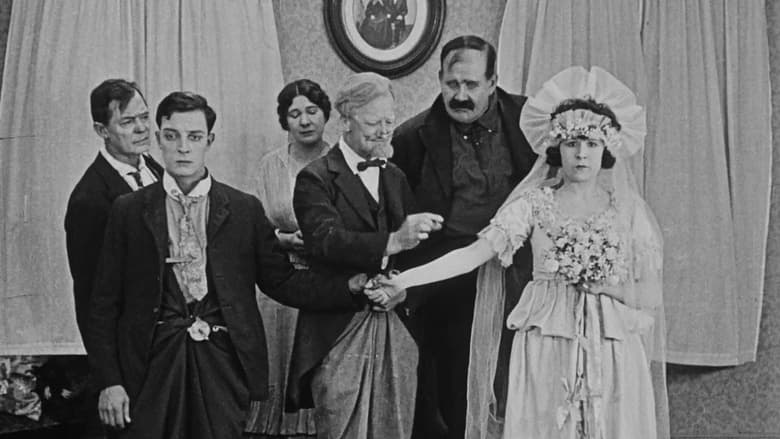
Neighbors (1920)
The Romeo and Juliet story played out in a tenement neighborhood with Buster and Virginia's families hating each other over the fence separating their buildings.
Watch Trailer
Cast


Similar titles
Reviews
If you don't like this, we can't be friends.
hyped garbage
It’s not bad or unwatchable but despite the amplitude of the spectacle, the end result is underwhelming.
A great movie, one of the best of this year. There was a bit of confusion at one point in the plot, but nothing serious.
Silent genius Buster Keaton takes his usual lumps from his dad among others in Neighbors, a Romeo and Juliet scenario set in the visually tight confines of next door neighbors back "yards".Once again Keaton throws care to the wind as he performs a series of what had to be injury inducing stunts. Keaton's feats are remarkable but there is little time for subtlety as well as a small stage to perform that stunts growth. But with Keaton then and as he proved 45 years later on Candid Camera all the space he needed was a lunch counter. Not even Burt Lancaster was as acrobatic as Buster in his prime and no one was as daring.In addition to Keaton's acrobatics a supporting cast (featuring a sweet performance by Virgina Fox) all comically contribute in moments of blown out of proportion misunderstandings.
This is one of the few short films that was understated on the back on the DVD. Usually they make it sound better than it often winds up. Despite little buildup, this was tremendous fun for 18 minutes.The very beginning is very innocent as Harold and Virginia Fox exchange love notes through a peephole in a fence that divides their family's tenement properties. Quickly, the parents of each come out, intercept the messages, disapprove, meddle further and then get involved in one wild and crazy scene after another. Featured are some terrific stunts and just general madness and mayhem with one funny sight gag after another. This is so frenetic that it has to be seen, not read about. Just be ready for a wild ride of feuding neighbors and cops. It does calm down for a minute or two when a judge makes the parents sign a "peace treaty." Harold then announces he and Virginia are going to get married.....and they try to do that but, a combination of pants that won't stay up (don't ask) and Virginia's father, Big Joe Roberts, break that up. Now we go back to slapstick and clever scenes as Buster's friends help get his girl back. It's another crazy finish, albeit a short one.It's very inventive stuff and one of Harold's best. It is an extra on the "Seven Chances" DVD. Note: Playing Buster's dad in here was his real-life father, Joe Keaton.
A viewer who has never seen a Buster Keaton comedy might get the wrong idea of what to expect from this film's introductory title card, which reads: "The Flower of Love Could Find No More Romantic Spot in Which to Blossom Than in This Poet's Dream Garden." We are then shown a grungy courtyard between two tenement buildings divided by a fence, and on opposite sides of the fence we find The Boy (Buster) and The Girl (Virginia Fox), sweetly in love but kept apart by feuding parents. But fear not, for the flowery wording of that introduction is meant in jest: Neighbors is no exercise in Griffith-style sentimentality about poor people. (For one thing, if D.W. Griffith had directed this he'd have called it "Romeo & Juliet of the Slums" or perhaps "Pyramis & Thisbe of Pig Alley.") This isn't a melodrama of life among the lowly, it's Buster in his youthful prime, and it's funny. There's action and comedy galore, and it's interesting to observe that the attitude expressed towards love and marriage is far from sentimental --which is a little surprising, considering that 24 year-old Buster was still a fun-loving bachelor when he made this movie.In any event, once the situation is established we are treated to a series of fast-moving gag sequences emphasizing the hostile relationship between The Girl's father (played by Buster's frequent screen nemesis Big Joe Roberts) and The Boy's father (played by Buster's own dad Joe Keaton). It is clear that the two fathers hold each other in contempt, and vigorously oppose any closer relationship between their respective families. There's a great example of Keaton's special brand of physical comedy early on when Buster attempts to visit Virginia in her third floor room. When he's caught by her father he promptly flings himself out her window, across a clothesline that leads to his own window across the way, down a banister and back across the clothesline to Virginia's building, right smack into Big Joe. The sequence flashes by in seconds and may leave you blinking in amazement, but before you can catch your breath Buster has been forcibly hung upside down by his feet from the clothesline, hauled back across the courtyard like dirty laundry, and then (accidentally) beaten by his father, who has mistaken his own son for a rug. Moments later, Buster is dumped head-first through a rain barrel into sopping wet mud. And so it goes! Welcome to This Poet's Dream Garden.Neighbors is a comedy better seen than described. At times it feels like a live-action Warner Brothers cartoon, but instead of Bugs Bunny and Yosemite Sam we're watching actual people perform these stunts. The premise of feuding families is a simple and effective framework for Keaton's terrific set-pieces. (He would return to the family feud motif on a much grander scale in Our Hospitality a few years later.) The rougher slapstick material is briefly held in check as the brawling families are dragged into court, chastised by a judge, and ordered to permit their offspring to wed. But needless to say the ceremony is a disaster, and the action resumes with a wild finale in which Buster and Virginia escape from their families to elope. The best gag sequence is saved for last, as Buster takes part in a three-man balancing act racing through the streets, a bit that required the participation of the Flying Escalantes, a team of acrobats Buster knew from his vaudeville days. Latter day cartoon directors such as Chuck Jones and Tex Avery often gave credit to the influential silent era comedians they'd admired as kids, and the finale of this film must surely have been the sort of thing they were talking about.While Neighbors may not rank in the very top tier of Keaton's output it's an exhilarating, highly amusing comedy that holds up well today. Besides, Buster's second-echelon efforts are better than most anyone else's masterworks!
Buster Keaton rarely played low lifes. He played naive or boyish aristocrats who were loners, friendless and lost in modern society with social malaise sewn into the seams. Here, he plays a mischievous imp, a character Chaplin perfected as the tramp and all hell lets loose. Obviously, he is in love with his neighbor, but the family is feuding though they share the same backyard. A billet-a-doux gets everything moving as mistaken identity and information leads to some yelling and scolding before the real truth is figured. "Old Stone face" himself as he was known unleashes some very nifty and nimble acrobatic moves as he slides up and down the electric lines and clothes hanger lines like a jabberwocky. A three man stunt is ridiculous to watch and leaves you applauding and marveling at his genius.


